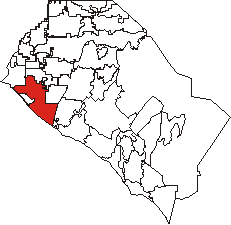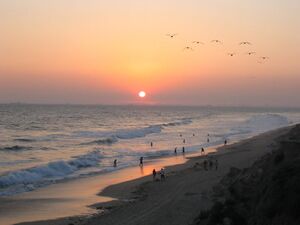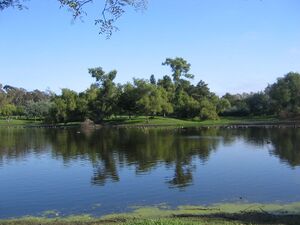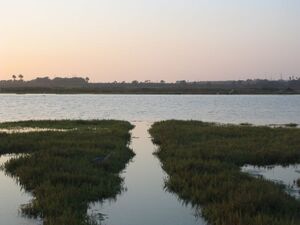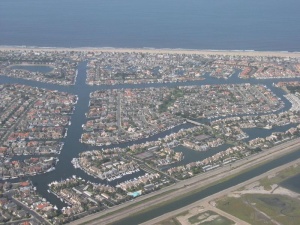Directory:Huntington Beach
| City of Huntington Beach, California | |
| Nickname: "Surf City" | |
| Location of Huntington Beach within Orange County, California. | |
| Country | United States |
|---|---|
| State | California |
| County | Orange County |
| Mayor | Dave Sullivan |
| Area | |
| - City | 31.6 sq. miles / 81.7 1 E7 |
| - Land | 26.4 sq. miles / 68.3 km² |
| - Water | 5.2 sq. miles / 13.4 km² |
| Population | |
| - City (2000) | 189,594 (US Census) |
| - Density | 2,773.9/km² |
| Time zone | PST (UTC-8) |
| - Summer (DST) | PDT (UTC-7) |
| Website: http://www.ci.huntington-beach.ca.us | |
Huntington Beach is a seaside city in Orange County in southern California. As of the 2000 census, the city population was 189,594. It is bordered by the Pacific Ocean on the west, by Seal Beach on the north, by Costa Mesa on the south, by Westminster on the northeast, and by Fountain Valley on the east.
It is known for its long 14 km (8.5 miles) beach, mild climate, and excellent surfing. The waves are a unique natural effect caused by edge-diffraction of ocean swells by the island of Catalina, and waves from distant hurricanes. Because of the curve of the coastline at Huntington Beach, the local beach actually faces southwest. In summer, the southwest-facing beach often has very strong surf from hurricanes off the Mexican coast.
History
Huntington Beach incorporated in 1909 under its first mayor, Ed Manning. Its original developer was the Huntington Beach Company, a real-estate development firm owned by Henry Huntington, a railroad magnate after whom the city is named. The Huntington Company is still a major land-owner in the city, and still owns most of the local mineral rights.
The city's first high school, Huntington Beach High School was built in 1906. The school's team, the Oilers, are named after the city's original natural resource.
Sister Cities
Huntington Beach has the following sister city relationships, according to The Huntington Beach Sister City Association:
Sports
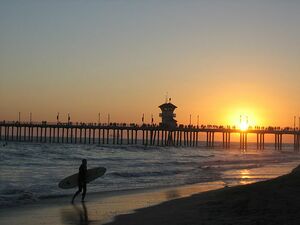
Huntington Beach is the site of the world surfing championships, held in the summer every year. The city is often referred to as "Surf City" because of this high profile event, its history, and culture of surfing. In 1985, the event erupted into a riot with police vehicles being overturned and burnt.
Huntington Beach is also a popular destination for kite surfing, and this sport can be viewed on the beach north-west of the pier.
Tourism
The city has the largest public pier on the west coast.
The city also has the oldest Independence Day parade in the Western United States. This is televised locally on the public access cable channel.
The downtown district includes an active art center, a colorful shopping district, youth hostel, and the International Surfing Museum. This district was also once the home of the famous restaurant and music club "The Golden Bear." In the late '60s and '70s it hosted many famous bands and acts.
- The beaches and surfing. Major surf competitions are held here each year.
- The pier that goes from Main Street into the Pacific Ocean. At the end of the pier is a restaurant called Ruby's.
- Downtown, including many local surf shops, cafés, restaurants and bars.
- The Surfing Museum in downtown Huntington Beach
Special events
- annual Cruise of Lights Boat Tour: This is a 'parade' of colorful lighted boats through the Huntington Harbour bayside neighborhood for two weekends in mid-December. [1]
City parks and amenities
Huntington Beach has a very large Central Park, located between Gothard and Edwards Streets to the east and west, and Slater and Ellis Avenues to the north and south. The park is vegetated with xeric (low water use) plants, and inhabited by native wildlife. Thick forests encircling the park are supplemented with Australian trees, particularly eucalyptus, a high water use plant.
The Huntington Beach Public Library is located in Central Park in a notable building designed by Richard Neutra, Dion Neutra and Mario Pei. It houses almost a half-million volumes, as well as a theater, gift shop and fountains. The library was founded as a Carnegie library in 1914, and has been continuously supported by the city and local activists, with new buildings and active branches at Banning, Oak View, Main Street, and Graham. The library has significant local historical materials and has a special genealogical reference collection. It is independent of the state and county library systems.
The park is also home of Huntington Central Park Equestrian Center, a top class boarding facility that also offers horse rentals to the public, with guided trail rides through the park. A Frisbee disc golf course is available in the park, as are two small dining areas, a Sports Complex for adult use, the Shipley Nature Center.
Because of its land-use policies, Huntington Beach has the largest ratio of park area to person of any city in the United States. Template:Fact Almost all schools have playing fields arranged for public access as parks, with park-like amenities near major streets, and schools near the centers of blocks. Since Huntington Beach contains a major power generating station, the high-voltage rights-of-way are numerous, and have also been zoned as parks with walkways.
Natural resources
Construction of any kind on the beach is prohibited without a vote of the people, allowing Huntington Beach to retain its natural tie to the ocean rather than having the view obscured by residential and commercial improvements.
Between Downtown Huntington Beach and Huntington Harbour lies a large marshy wetland, much of which is protected within the Bolsa Chica State Ecological Reserve. A $110 million restoration of the wetlands was completed in 2006. [2] The Reserve is popular with bird watchers and photographers.
South of Downtown, the Talbert and Magnolia Marshes lie on a strip of undeveloped land parallel to Huntington State Beach and are in the process of restoration, as well.
The northern and southern beaches (Bolsa Chica State Beach and Huntington State Beach, respectively) are state parks. Only the central beach (Huntington City Beach) is maintained by the city. Camping and RVs are permitted here, and popular; campsites for the 4th of July and the Surfing Championships must be reserved many months in advance. Bolsa Chica State Beach is actually a sand bar fronting the Bolsa Bay and Bolsa Chica State Ecological Reserve.
The Orange County run Sunset Marina Park [3] next to Huntington Harbouris part of Anaheim Bay. It is suitable for light craft, and includes a marina, launching ramp, basic services, a picnic area and a few restaurants. The park is in Seal Beach, but is only reachable from Huntington Harbor. The Sunset/Huntington Harbour area is patrolled by the Orange County Sheriff's Harbor Patrol [4].
The harbor entrance for Anaheim Bay is sometimes restricted by the US Navy, which loads ships with munitions at the Seal Beach Naval Weapons Station to the north of the main channel.
Education
Huntington Beach is also the home of Golden West College, which offers two-year associates of arts degrees, and transfer programs to state universities.
The public television station KOCE-TV operates from the Golden West College campus, in conjunction with the Golden West College Media Arts program.
Huntington Beach is in the Huntington Beach Union High School District. Which includes Edison High School, Huntington Beach High School, Marina High School, and Ocean View High School.
Huntington Beach High School recently celebrated its 100 year anniversary in 2006.
Climate
The climate is generally sunny, dry and cool, although evenings can be excessively damp. In the morning and evening, there are often strong breezes, 15 mph (25 km/h). Ocean water temperatures average 55 to 65 °F (10 to 15 °C). In the summer, temperatures rarely exceed 85 °F (25 °C). In the winter, temperatures rarely fall below 40 °F (4 °C), even on clear nights.[5] There are about 10 inches (250 mm) of rain, almost all in mid-winter. Frost occurs only rarely on the coldest winter nights.
The area is annually affected by "June Gloom", caused by the cool air of the pacific meeting the warm air over the land. This results in overcast and foggy conditions in May and June, pestering tourists and surfers alike.
Economy
Huntington Beach also sits above a large natural salt dome containing oil. Although the oil is mostly depleted, extraction continues at a slow rate, and still provides significant local income. There are only two off-shore extraction facilities left, however, and the day is not far off when oil production in the city will cease and tourism will replace it as the primary revenue source for resident industry.
Huntington Beach has an off-shore oil terminus for the tankers that support the Alaska Pipeline. The terminus pipes run inland to a refinery in Santa Fe Springs. Huntington Beach also has the Gothard-Talbert terminus for the Orange County portion of the pipeline running from the Chevron El Segundo refinery.
Several hotels have been constructed on the inland side of Pacific Coast Highway (California Highway 1) within view of the beach, just southeast of the pier.
Huntington Beach contains a major installation of Boeing, formerly McDonnell-Douglas. A number of installations on the Boeing campus were originally constructed to service the Apollo Program, most notably the production of the S-IVB upper stage for the Saturn IB and Saturn V rockets, and some nearby telephone poles are still marked "Apollo Dedicated Mission Control Line."
Huntington Beach contains the administrative headquarters of Sea Launch, a commercial space vehicle launch enterprise whose largest stockholder is Boeing.
Huntington Beach contains a small industrial district in its northwest corner, near the borders with Westminster and Seal Beach.
Safety
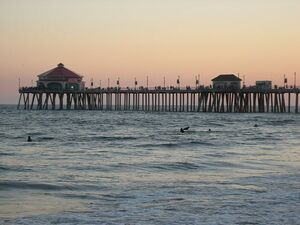
The city often ranks among the top 10 safest cities for its size in terms of crime Template:Fact, and in the top 30 of all safest U.S. cities in 2006 per the Morgan Quitno Press (based on FBI figures).
Fire protection in Huntington Beach is provided by the Huntington Beach Fire Department. Law enforcement is provided by the Huntington Beach Police Department. Its life guards are recognized as some of the best in the world with a top notch safety record. It has an active Community Emergency Response Team training program, that trains citizens as FEMA-Certified Disaster Service Workers as a part of a free program run by the fire department's Office of Emergency Services.
Huntington Beach is also one of the most emergency-prone settled areas on the West Coast of the United States. Template:Fact This is a direct result of its attractive geographic features. The beach was naturally constructed by the Santa Ana River's delta. Some settled areas of Huntington Beach lie within the 100-year and 50-year flood zone. Some parts of the delta require powered pumping to remove water during heavy rains. Some parts do not drain effectively at all, and in these areas, local flooding is common during heavy rain (although this threat is remote and poses no danger to human life).
In 1926, the Santa Ana River dam failed, and flash-flooded its entire delta. The southern oceanic terminus of this delta is now a settled area of Huntington Beach. The distant dam is still functional, but silting up, which is expected to reduce its storage volume, and therefore its effectiveness at flood-prevention. The flood and dam-endangered areas are protected by a levee, but lenders require expensive flood insurance in the delta. There have been serious discussions to eliminate the need for flood insurance and this requirement has already been waived in some areas and may one day no longer be considered a credible threat.
Since it is a seaside city, Huntington Beach has had tsunami warnings, storm surge (its pier has been rebuilt three times), sewage spills, tornadoes and waterspouts. The cold offshore current prevents hurricanes. The Pier that was rebuilt in the 90s was engineered to withstand severe storms or earthquakes.
Large fractions of the settled delta are in earthquake liquefaction zones above known active faults. Most of the local faults are named after city streets.
Many residents (and even city hall) live within sight and sound of active oil extraction and drilling operations. These occasionally spew oil, causing expensive clean-ups. Large parts of the developed land have been contaminated by heavy metals from the water separated from oil.
The local oil has such extreme mercury contamination that metallic mercury is regularly drained from oil pipelines and equipment. Oil operations increase when the price of oil rises. Some oil fields have been approved for development. The worst-polluted areas have been reclaimed as parks. At least one Superfund site, too contaminated to be a park, is at the junction of Magnolia and Hamilton streets, near Edison High School.
The city's Emergency Operations Coordinator has said that, in a nuclear war, the city would probably be severely damaged in a first-strike against military targets. Template:Fact Because Huntington Beach adjoins Naval Weapons Station Seal Beach, and the center stores munitions (widely believed to include nuclear weapons), the Center is likely to be first-strike target for ground-burst thermonuclear weapons. Huntington Beach also includes a very large Boeing installation, which is an attractive strategic target.
"Surf City USA" Trademarks
Huntington Beach filed four applications to register the Surf City USA moniker in November of 2004. A ruling by the U.S. Patent and Trademark Office released on May 12, 2006 awarded three trademark registrations to Huntington Beach; four additional trademark registrations have been granted since this time and three other Surf City USA trademarks are under consideration. [6] Huntington Beach has already introduced the Surf City USA® Beach Cruiser by Felt Bicycles [7] and nearly a dozen other licensed products. [8] Several more trademark registrations and products are anticipated in the future.
On October 12, 2006, Flotsam of California, a T-shirt vendor in Santa Cruz, CA, filed suit against the nonprofit Huntington Beach Convention and Visitors Bureau [9]. A copy of the complaint can be found here [10]. In defending itself, the Bureau revealed the controvery was engineered by the merchants with secret assistance from the Santa Cruz County Conference and Visitors Council and local politicians to whip up sentiment and inflame local public opinion against Huntington Beach. The merchants then sold and profited from thousands of infringing shirts which were promoted as "collector's items" in the wake of all the publicity. [11] For a copy of motion filed by the Bureau on November 13, 2006, see here [12]
City government controversies
Former pro-development mayor, Pam Julien Houchen, was sentenced in September 2006 to a 37-month sentence and ordered to pay $140,000 in restitution for a scheme that illegally converted Huntington Beach apartments into condominiums. [13]
Former mayor Dave Garofalo pleaded guilty to a felony and 15 misdemeanors and was sentenced to community service and probation for violating conflict-of-interest laws in January 2002. [14] [15]
Former mayor Jack Kelly was fined $4,000 by the Fair Political Practices Commission on two counts of improper financial disclosure in 1988 [16].
Geography
According to the United States Census Bureau, the city has a total area of 81.7 km² (31.6 mi²). 68.3 km² (26.4 mi²) of it is land and 13.4 km² (5.2 mi²) of it (16.38%) is water.
The entire city of Huntington Beach lies in the 714 Area Code, except for parts of Huntington Harbour, which are 562 Area Code.
Demographics
As of the censusGR2 of 2000, there were 189,594 people, 73,657 households, and 47,729 families residing in the city. The population density was 2,773.9/km² (7,183.6/mi²). There were 75,662 housing units at an average density of 1,107.0/km² (2,866.8/mi²). The racial makeup of the city was 79.22% White, 0.81% Black or African American, 0.65% Native American, 9.34% Asian, 0.24% Pacific Islander, 5.81% from other races, and 3.94% from two or more races. 14.66% of the population were Hispanic or Latino of any race.
There were 73,657 households out of which 29.0% had children under the age of 18 living with them, 50.7% were married couples living together, 9.6% had a female householder with no husband present, and 35.2% were non-families. 24.3% of all households were made up of individuals and 6.7% had someone living alone who was 65 years of age or older. The average household size was 2.56 and the average family size was 3.08.
In the city the population was spread out with 22.2% under the age of 18, 8.4% from 18 to 24, 34.9% from 25 to 44, 24.0% from 45 to 64, and 10.4% who were 65 years of age or older. The median age was 36 years. For every 100 females there were 100.4 males. For every 100 females age 18 and over, there were 98.6 males.
The median income for a household in the city was $64,824, and the median income for a family was $74,378. Adult males had a median income of $52,018 versus $38,046 for adult females. The per capita income for the city was $31,964. About 4.3% of families and 6.6% of the population were below the poverty line, including 8.2% of those under age 18 and 4.4% of those age 65 or over.
Many families spend 40% or more of their incomes on housing. Single family dwellings within two miles of the beach normally sell for $600,000 or more. Two bedroom apartments usually rent for $2,000 per month or more.
Huntington Beach in the Media
- Dean Torrance, half of the singing duo Jan and Dean, who, along with Brian Wilson of the Beach Boys, penned the famous song "Surf City" (reaching #1 on the charts in 1963) says it is Huntington Beach which embodies the song's spirit of freedom and California fun [1]
- The city is mentioned in the Beach Boys song Surfin' Safari and in Surfer Joe by The Surfaris.
- Huntington Beach was the site of WCW Bash at the Beach 1995.
- The Huntington Beach Conference and Visitors Bureau has been sued by a merchant family in Santa Cruz over use of the term "Surf City USA"[17]. The Bureau has responded to the litigation with a motion to dismiss the case or change the proposed jury trial a different city that is not in northern California. [18]
External links
- Official City Website
- Aerial photograph of Huntington Beach, circa 1950s
- Downtown Huntington Beach Business Improvement District
- Carnegie Libraries' Web Site Entry for Huntington Beach
- Aerial photo of Huntington Beach from Microsoft Terraserver, 2004
- Huntington Beach Surf Photo Galleries (LocalSurf.net)
Cities
Population over 100,000: Santa Ana (County seat) • Anaheim • Costa Mesa • Fullerton • Garden Grove • Huntington Beach • Irvine • Orange
Population 50,000 – 100,000: Buena Park • Fountain Valley • La Habra • Laguna Niguel • Lake Forest • Mission Viejo • Newport Beach • Tustin • Westminster • Yorba Linda
Population under 50,000: Aliso Viejo • Brea • Cypress • Dana Point • La Palma • Laguna Beach • Laguna Hills • Laguna Woods • Los Alamitos • Placentia • Rancho Santa Margarita • San Clemente • San Juan Capistrano • Seal Beach • Stanton • Villa Park
Census-designated places
Coto de Caza • Las Flores • Rossmoor • Tustin Foothills
Unincorporated communities
Dove Canyon • Ladera Ranch • Midway City • Orange Park Acres • Santa Ana Heights • Sunset Beach • Silverado • Trabuco Canyon
- ^ <templatestyles src="Module:Citation/CS1/styles.css"></templatestyles>"Where's the real Surf City, USA?". Christian Science Monitor. Retrieved 2005-07-20.
